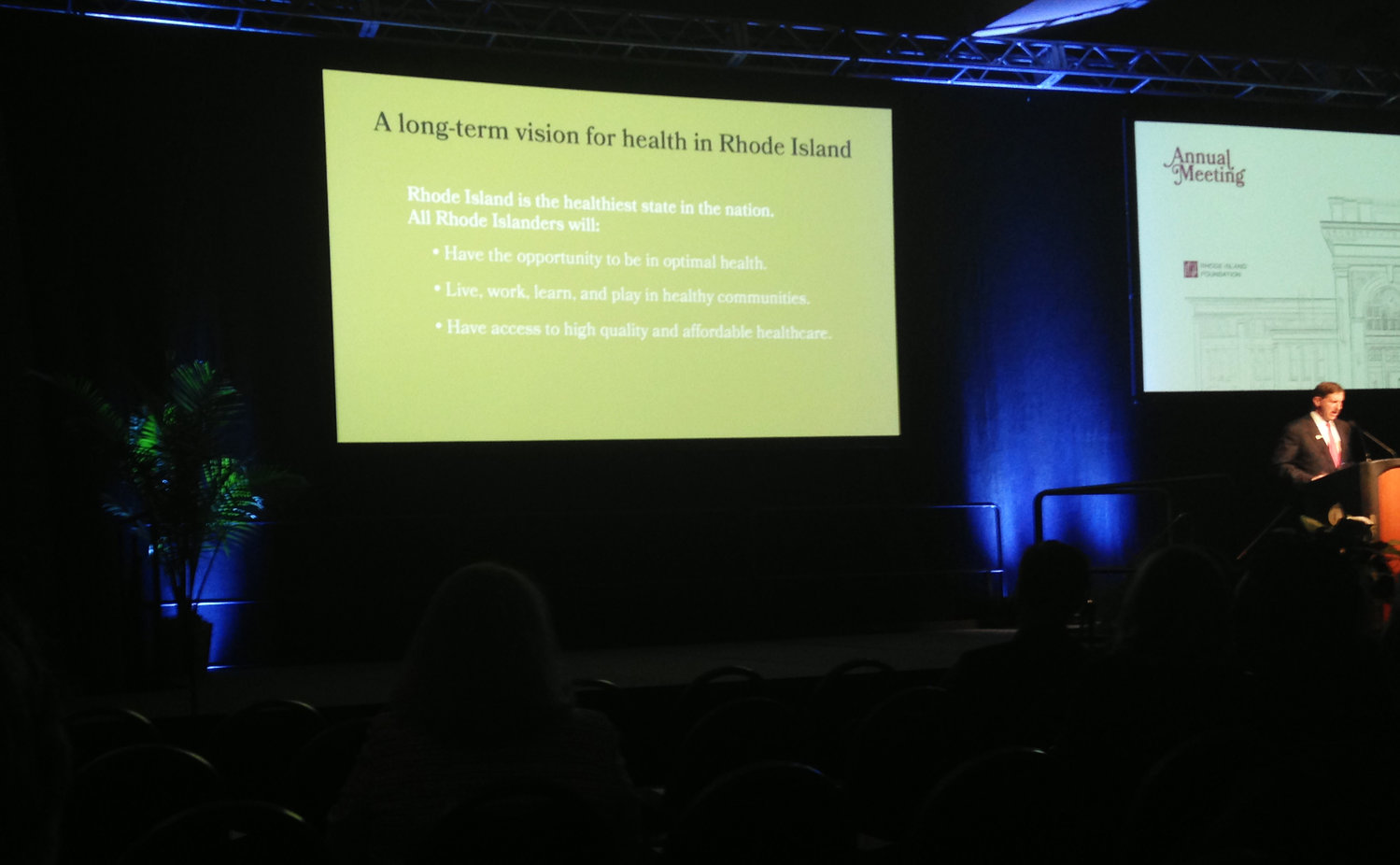The time has come today
Rhode Island Foundation puts the priority on developing statewide, long-term plans for health and education
The ongoing trade war over tariffs with China has badly hurt American farmers; the costs of health care are still increasing, having not yet peaked; the diseases of despair – deaths from alcohol, suicide and drug overdoses afflicting people between the ages of 25-34 – continue to plague our nation; the demographics of an aging population and a falling birth rate undercut many of the assumptions about what is a single-family home; and the threats from climate change continue to become more and more evident, interrupting our assumptions about daily life.
To talk about such things is not negativity but realism. The question is: who gets to sit in on the conversation and be included in the decision-making?
PROVIDENCE – At the annual meeting of the Rhode Island Foundation, held on Thursday evening, May 16, at the Rhode Island Convention Center, there was something for everyone on the menu: food, drink, awards, conversations, and collisions.
Before an audience of more than 850 in attendance, the annual meeting opened with an earnest performance of the Rhode Island Children’s Chorus, [“we will stand side by side and be free”], followed by a welcome by Polly Wall, the chair of the Rhode Island Foundation Board.
Then Neil Steinberg, the president and CEO of the Rhode Island Foundation, gave his report, summarizing the achievements in the past year in philanthropy: nearly $1 billion in total assets, a 7.2 percent return on investment funds over 20 years; $114 million in new funds raised [with a healthy boost coming from the decision by the Jewish Federation Foundation becoming a supporting organization]; and $52 million distributed in grants to more than 1,900 nonprofit organizations.
The 103-year-old community foundation, Steinberg said, has “built a ship for all weather,” built on the belief that by working together, “we can make a difference.”
No question, the Rhode Island Foundation, under Steinberg’s leadership, has served as the intentional driver [no driverless vehicles welcome here] of economic, arts, health and education philanthropic investment policies in Rhode Island.
In 2019, in what Steinberg described as an “aspirational and inspirational” effort, the Rhode Island Foundation has chosen to undertake a leadership role in developing long-term strategic plans to shape the future of health and education in Rhode Island.
The more than 30-member select group of health care leaders have forged a long-term vision in Rhode Island, Steinberg said, which was displayed on the big screen, proclaiming that Rhode Island would become “the healthiest state in the nation,” promising that all Rhode Islanders would have the opportunity to be in optimal health, that they would be able to live, work, learn and play in healthy communities, and that they would have access to high quality and affordable health care.
Steinberg acknowledged, as a starting point, that the current status of health care in Rhode Island and the nation is beset with threats and challenges: life expectancy ins the U.S. has been falling, in part because of the opioid epidemic; health disparities still exist according to the zip code where you live; and just getting more people insured does not equal better access to health care.
Steinberg also spoke about the efforts now underway by a steering committee to establish a 3.2 percent cap on the annual growth rate of medical expenses.
‘This is the moment in time’
Steinberg then shared the efforts now underway, under the guidance of the Rhode Island Foundation, to forge a new vision of education direction in the state, focused on pre-K-12 public education, based upon what he called “commitment and common sense.”
To inform the work, Steinberg spoke about the need to learn from what he called the Massachusetts experience and its effort begun back in 1993 to invest in education.
“This is a moment in time,” he said. “We don’t get them that often.”
Steinberg closed, on an optimistic note, by saying: “We are Rhode Islanders. We have hope for the future.”
Collisions in the food lines
As the guests moved to the food and drink lines, it was difficult not to bump into people, many who wanted to talk with ConvergenceRI about recent stories: one communications professional praised the recent interview with Dr. James Fanale, president and CEO of Care New England, for the way that the skillful questions created an honest dialogue; a CEO of a health facility wanted to talk about the story on Clinica Esperanza and the efforts to reduce unnecessary visits to the emergency room; a member of the recovery community wanted to talk about the lack of meaningful dialogue occurring at the Governor’s Task Force on Overdose Prevention and Intervention. A women’s health advocate talked about how depressing the news was as states such as Alabama, Georgia and Missouri enacted statutes making abortion illegal, as well as the failure by the R.I. Senate Judiciary Committee to pass the Reproductive Health Care Act.
Representatives from two or three of the usual interest groups appeared to be missing from the gathering, many of whom had attended the past three annual meetings [although, given the size of the crowd, they would have been easy to miss]: those actively involved in promoting the innovation economy in Rhode Island; top officials from CommerceRI; and members of the news media [only WPRI’s Ted Nesi was present].
Editor's Note: Neil Steinberg of the Rhode Island Foundation offered a correction: Stefan Pryor of CommerceRI did attend the annual meeting.






